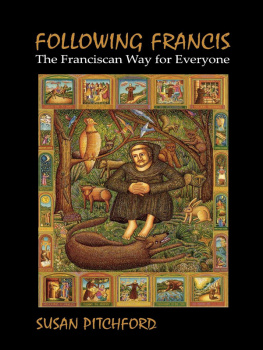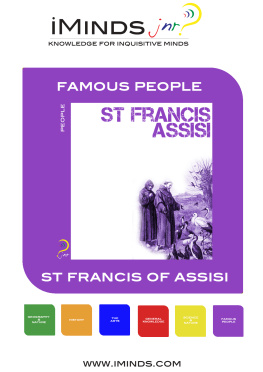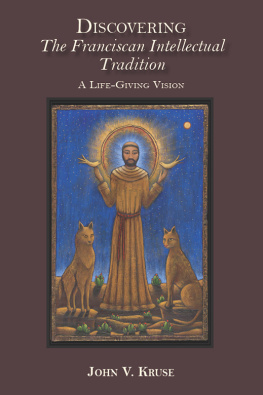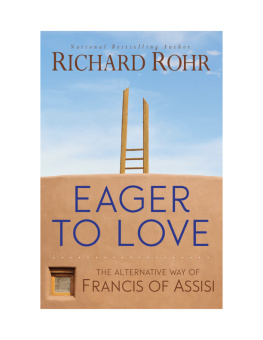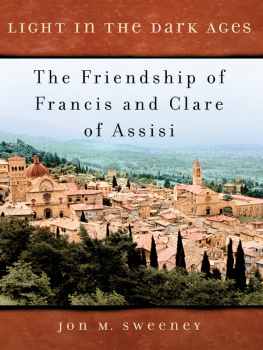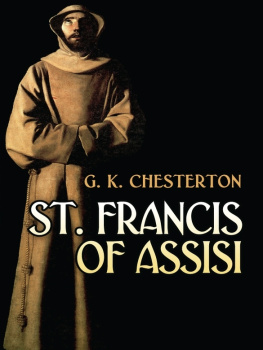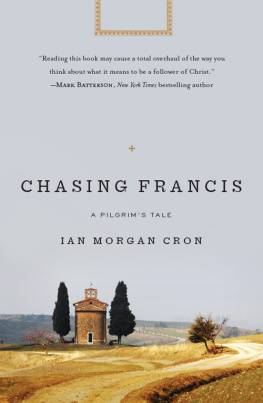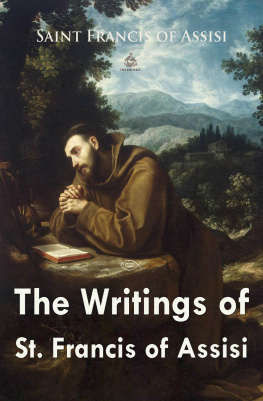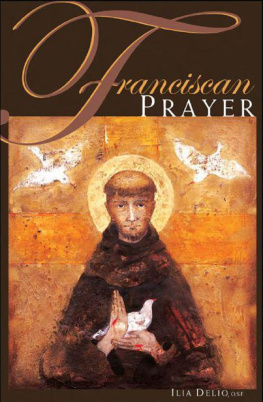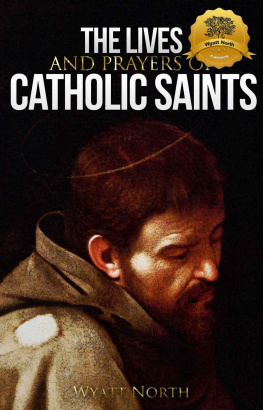This is a book about being part of a community, and it certainly wasn't written in isolation. Three people were especially generous with their time and feedback: Edie Burkhalter, Wes Howard-Brook and Kim Pitchford. I might as well admit now that the debt I owe them will never be repaid. Fr. Allan Parker, my spiritual director, also read the manuscript as part of his general responsibility for keeping me on track. If there is any actual heresy in these pages, it's probably his fault. Fellow Franciscans who read early drafts include Dianne Aid, Barbara Baumgarten, Bill Berge, Crystal Bradford, Beverly Hosea and Adrienne Papermaster, and I am grateful for their impressions and insights. Marilyn Brandenburg read a draft and gave me her blessing shortly before her death in the fall of 2005; I remember her with deepest affection. Nancy Fitzgerald's enthusiasm for the project and her experience and expertise have made her the ideal editor for a first time author, and copyeditor Jennifer Hackett's encouragement and amazing eye have also been welcome gifts. Finally, my deepest thanks go to my husband Bob Crutchfield, who daily makes me grateful that I can follow Francis in the world.
Preface
IM STANDING IN A TINY ROOM carved out of the rock face of a cliff outside Assisi, looking down at the bed St. Francis slept on eight hundred years ago. My guidebook says that Francis liked an uncomfortable bed; feeling that time spent sleeping was time stolen from prayer, he liked to wake up often during the night. This tiny little bed, on which the great saint lay, would certainly do the trick: it's also carved out of the rock, and none too gently.
What a statement this ill-shapen little bed makes about Francis passionate dedication to God. I, on the other hand, need my eight hours. I become cross when I don't get themalso stupid, which makes me more cross. Of course, Francis also fasted a lot, which is another discipline I have yet to master. Francis was a celibate, who made Lady Poverty his bride, whereas my husband and I make a living that is comfortable by American standards, outrageously luxurious by those of much of the world. Francis thought book learning made people susceptible to pride, and was suspicious of academics. I am a sociologist at a major universitythough I confess that I am also suspicious of academics at times. Francis took Christ at his word when he said, Sell all that you have, give to the poor, and come and follow me. He relinquished his ordinary life in the world to follow his master without distractions. I, on the other hand, live very much in the world, and constantly fight its seductions and demands.
And yet, I am a Franciscan. I am a member of the Third Order of the Society of St. Francis, the worldwide Anglican order for those who wish to live a Franciscan life without removing themselves from the world. Third Orders existed before Francis time, and continue to offer Anglicans, Roman Catholics and others a way of living their Franciscan, Carmelite, Dominican or other vocation right where they are. Other Franciscan Third Orders include the Secular Franciscan Order (Roman Catholic) and the Order of Ecumenical Franciscans. Third Order members, called Tertiaries, are male and female, married and single, clergy and laity; some of us do church work for a living, but most of us have ordinary jobs. Francis himself founded the Third Order when Luchesio and Buonadonna, a husband and wife from Poggibonsi, wanted to share in his vision while remaining together as a couple. Francis set up the Order of Penance, which became the Third Order, and Pope Honorius III approved the Rule of the Order in 1221. Third Order Franciscans live a vowed life under a Rule with a set of definite components, flexible enough to accommodate people living in widely differing circumstances. What we all have in common is a deep commitment to following Jesus Christ, with Francis as our guide.
And so I am a Franciscan. An affluent, married, professional woman in twenty-first century America, I am trying to live according to a Rule established in the thirteenth century by an Italian religious fanatic barely five feet tall, and as medieval in mindset as he was in body. How this happened, and what it means to try to translate Franciscan spirituality into my own life and times, is what this book is about. It's organized around the nine elements of the Rule (Holy Eucharist, prayer, penitence, self-denial, simplicity, study, work, retreat and obedience), with additional chapters on other central Franciscan themes such as humility, chastity, love and joy. This book is very much the work of a newcomer to the Order, the story of someone encountering Francis for the first time. There are plenty of writers whose reflections on the Franciscan way have the mellow patina of maturity, and they are well worth reading.
My objective is to speak to others who are where I was just a few years ago when this process began: wanting to go deeper in the spiritual life, and wanting the company of a community on the same path, but wondering where to begin. Affiliating with a religious order, whether as a full member or an associate or oblate, is one answer among many to that question. I suspect there are others for whom it might be a satisfying answer, too, if only they knew it existed, both in the Franciscan and other monastic traditions. This book is written for them, but also for those who are interested in exploring Franciscan spirituality on their own, as well as those who are attracted to the structure of a Rule of life based on the classical spiritual disciplines, whether linked to an existing order or not.
I wrote most of this book during a five-month period of extensive travel that included sabbatical stays in Cambridge, England, and Bellagio, Italy, as well as vacation time in Italy and Spain, a pilgrimage to Assisi, and field research in Western and Eastern Europe and Ghana. There is thus a sort of double-journey metaphor running through these pages. One of the benefits of travel is that it takes you out of your ordinary life and provides a change of background against which you can see familiar questions and struggles in fresh ways, bringing new issues to the surface. Because my field research involved visiting museums dedicated to historical atrocities, many of the places in which I wrote posed questions of their ownurgent, contemporary questions that Francis, even from a distance of eight hundred years, has helped me begin to answer.

